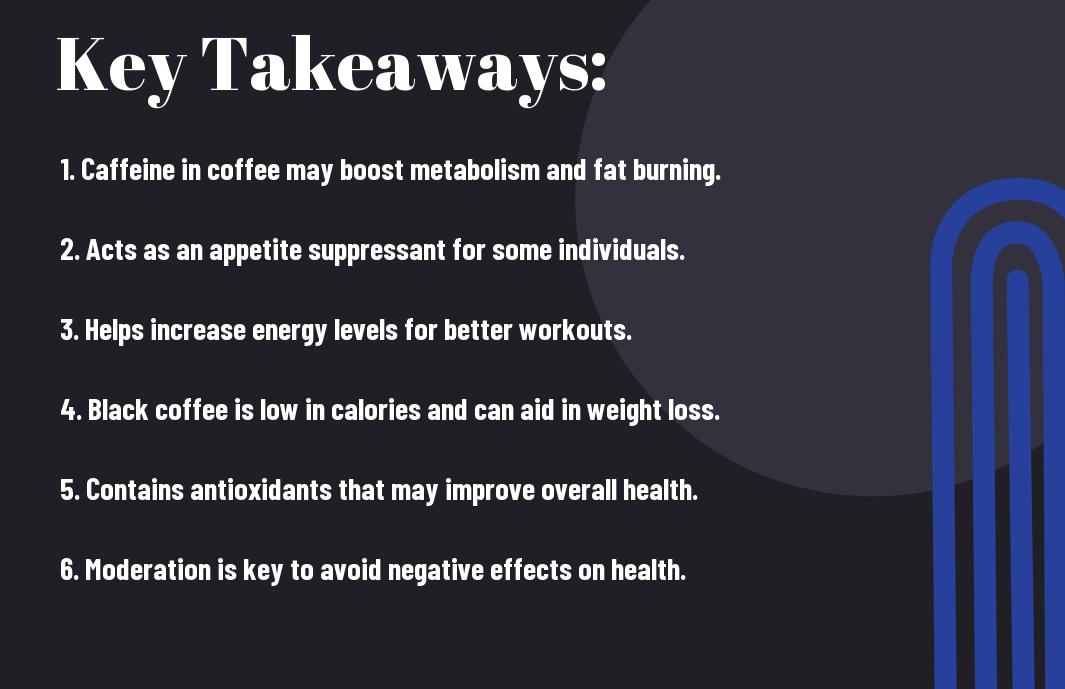Most of us are familiar with the energizing effects of coffee, but did you know that it might also be a secret weapon in the battle against the bulge? In this article, we’ll examine the research behind coffee and weight loss, exploring how this beloved beverage could potentially aid in shedding those extra pounds. So grab a cup of joe and let’s explore the link between coffee and your waistline.
Key Takeaways:
- Caffeine can boost metabolism: Coffee contains caffeine, which can help increase metabolism and promote fat burning.
- Suppresses appetite: Drinking coffee can help suppress appetite, leading to reduced calorie intake.
- Enhances exercise performance: Caffeine in coffee can improve physical performance during workouts, aiding in weight loss efforts.
- Potential to target fat cells: Some studies suggest that coffee may help target fat cells for energy use, aiding in weight loss.
- Stick to moderation: While coffee can have weight loss benefits, it’s crucial to consume it in moderation and be mindful of added sugars or high-calorie toppings.

The Science Behind Coffee and Weight Loss
Caffeine’s Role in Boosting Metabolism
One of the key components in coffee that may aid in weight loss is caffeine. Caffeine is a natural stimulant that can increase your metabolic rate, causing your body to burn more calories at rest. Studies have shown that caffeine can boost metabolic rate by 3-11%, which can lead to greater calorie expenditure over time.
How Coffee Affects Hunger and Satiety
Behind the potential weight loss benefits of coffee lies its ability to affect hunger and satiety. Coffee has been found to decrease feelings of hunger, which can ultimately lead to consuming fewer calories throughout the day. Additionally, coffee may increase feelings of fullness, helping you to better control your appetite and prevent overeating.
Satiety, or the feeling of fullness after a meal, is crucial in managing weight. By including coffee in your diet, you may experience improved satiety, which can contribute to weight loss efforts when combined with a balanced diet and regular exercise. The combination of caffeine’s metabolic boost and coffee’s impact on hunger and satiety make it a potentially beneficial addition to a weight loss regimen.

The Benefits of Coffee for Weight Loss
Increased Energy and Endurance
With its high caffeine content, coffee can be a valuable tool in your weight loss journey. Caffeine is known to boost metabolism and increase the oxidation of fatty acids, leading to a more efficient calorie burn. This can help you feel more energized during workouts, allowing you to push yourself harder and potentially burn more calories.
Improved Mental Clarity and Focus
Mental clarity and focus are crucial when trying to maintain a healthy lifestyle and make smart food choices. Coffee can help improve cognitive function, making it easier to stay on track with your weight loss goals. The stimulant effect of caffeine can enhance concentration and alertness, helping you resist cravings and make healthier decisions throughout the day.
Benefits: In addition to its physical effects on weight loss, the mental benefits of coffee should not be overlooked. By keeping your mind sharp and focused, you are better equipped to stay dedicated to your wellness journey and achieve long-term success.
Coffee’s Impact on Fat Burning
Enhancing Lipolysis and Fat Oxidation
Your morning cup of coffee may do more than just wake you up. Research suggests that coffee can help enhance the body’s ability to burn fat. The caffeine in coffee can stimulate the release of stored fat into the bloodstream, a process known as lipolysis. Once released, this fat is then available to be used as fuel for the body, promoting fat oxidation and potentially aiding in weight loss.
The Role of Chlorogenic Acid in Inhibiting Fat Absorption
The chlorogenic acid found in coffee has been linked to inhibiting fat absorption in the body. This compound has been shown to slow down the absorption of carbohydrates in the digestive tract, which can help prevent spikes in blood sugar levels and encourage the body to use stored fat for energy. By limiting the amount of fat absorbed from the diet, chlorogenic acid may play a role in weight management.
To further support this, a study published in the Journal of Nutritional Biochemistry found that chlorogenic acid reduced the accumulation of liver fat in mice fed a high-fat diet. This suggests that coffee’s chlorogenic acid content may have potential benefits in managing body weight and fat levels.

The Importance of Coffee Quality and Preparation
Keep in mind that the quality of the coffee you consume can play a significant role in its potential effects on weight loss. Opt for higher quality coffee beans, such as Arabica, over lower quality ones like Robusta. Arabica beans are known for their smoother taste and higher acidity, which may have a more beneficial impact on your metabolism and overall health.
Arabica vs. Robusta: Which is Better for Weight Loss?
Arabica beans are generally considered superior to Robusta when it comes to weight loss. They contain higher levels of lipids and sugar-burning antioxidants, which can potentially boost your metabolism and aid in fat breakdown. Additionally, the smoother taste of Arabica may reduce the need for added sugars or creams, making it a healthier choice overall.
Brewing Methods that Maximize Caffeine and Antioxidants
With various brewing methods available, such as pour-over, French press, or espresso, you can choose one that maximizes the caffeine and antioxidants in your coffee. For example, the longer brewing time of a French press can extract more beneficial compounds from the coffee grounds, providing you with a stronger dose of antioxidants and caffeine in each cup.
It’s imperative to experiment with different brewing methods to find one that suits your taste preferences while also maximizing the potential weight loss benefits of coffee. By choosing high-quality beans and preparing your coffee mindfully, you can harness its metabolism-boosting properties to support your weight loss journey.
Potential Drawbacks and Interactions to Consider
Caffeine Sensitivity and Anxiety
Despite its potential benefits, it’s important to consider that not everyone can tolerate caffeine in the same way. Individuals with caffeine sensitivity may experience side effects such as jitteriness, increased heart rate, or anxiety. If you are prone to anxiety or have experienced these symptoms before when consuming coffee, it may be best to limit your intake or opt for decaffeinated coffee instead.
Coffee’s Impact on Sleep and Insulin Sensitivity
On the topic of sleep, it’s worth noting that consuming coffee, especially in the afternoon or evening, can disrupt your sleep patterns. The stimulating effects of caffeine can interfere with your ability to fall asleep and stay asleep, which in turn can have negative implications for weight management. Additionally, coffee consumption can also impact insulin sensitivity, a key factor in regulating blood sugar levels and potentially influencing weight loss outcomes.
Plus, the addition of sugar, cream, or syrups to your coffee can contribute to excess calorie consumption, which may counteract any potential weight loss benefits. It’s important to be mindful of how you take your coffee and consider healthier alternatives to sweeten or flavor your brew, such as cinnamon or a splash of almond milk.
Real-Life Examples and Success Stories
Coffee as a Pre-Workout Boost
Unlike sugary energy drinks or expensive pre-workout supplements, coffee offers a natural and cost-effective way to boost your performance in the gym. With its high caffeine content, coffee can increase adrenaline levels, which can help you push harder during your workouts. Many fitness enthusiasts swear by a cup of coffee before hitting the gym for that extra energy kick.
Boost
How Coffee Can Help with Portion Control
With its ability to suppress appetite, coffee can be a valuable tool in managing portion control. By drinking a cup of coffee before a meal, you may feel fuller faster and consume fewer calories overall. This can be especially helpful for those looking to shed some extra pounds, as reducing portion sizes is a key aspect of weight loss.
Control
Coffee contains compounds that have been shown to reduce hunger and increase feelings of fullness. In addition to its appetite-suppressing effects, the ritual of enjoying a cup of coffee can also help curb mindless snacking and encourage mindful eating habits. By savoring each sip of your coffee, you may find yourself more in tune with your body’s hunger cues and less likely to overeat.
Final Words
Ultimately, while coffee may offer some benefits when it comes to weight loss due to its caffeine content, it is important to remember that it is not a magic solution on its own. A balanced diet, regular exercise, and overall healthy lifestyle choices are key components to achieving and maintaining a healthy weight. It’s always best to consult with a healthcare professional before making any drastic changes to your diet or lifestyle. For more information on the effects of caffeine intake on weight loss, you can refer to The effects of caffeine intake on weight loss: a systematic review and dos-response meta-analysis.
FAQ
Q: Can coffee help with weight loss?
A: Yes, coffee can help with weight loss due to its caffeine content. Caffeine is a natural stimulant that can increase your metabolic rate and help your body burn more fat.
Q: How does caffeine in coffee aid in weight loss?
A: Caffeine can boost your metabolism by 3-11% and increase fat burning by up to 10%. This can lead to a decrease in body weight over time.
Q: What is the recommended amount of coffee for weight loss benefits?
A: It is generally safe to consume 1-2 cups of coffee per day to avail of its weight-loss benefits. However, individual tolerance to caffeine may vary.
Q: Are there any risks of consuming too much coffee for weight loss?
A: Excessive consumption of coffee can lead to side effects such as insomnia, jitteriness, increased heart rate, and digestive issues. It is important to moderate your intake.
Q: Can adding sugar and cream to coffee negate its weight loss benefits?
A: Yes, adding sugar and cream to coffee can add extra calories and negate its weight loss benefits. It is best to consume black coffee or use minimal additives for optimal results.
What are the origins of coffee





